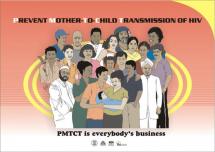Guyana HIV AIDS Reduction and Prevention Campiagn
In 2003 the Guyana HIV/AIDS Reduction and Prevention (GHARP) Project, a four-year collaboration between the governments of Guyana and the United States, began. The campaign focused on improving health infrastructure and enhancing the skills of health workers. Key to the success of the project was collaboration with 25 Guyanese NGOs and faith-based organizations.
GHARP was a national leader in implementing voluntary counseling and testing (VCT), and worked with the MOH to integrate these services into the MOH system. To provide counseling and testing to people who lived in hard-to-reach areas, GHARP offered technical guidance and support in setting up and managing a mobile testing team, which was transitioned to a local NGO in 2006. More than 70,000 people in Guyana received HIV counseling and testing through GHARP. GHARP also worked with the Ministry of Health to develop the Guyana National Strategic Behavioral Communication (SBC) Strategy, which served as a framework for all local SBC initiatives.
GHARP’s work emphasized building the organizational capacity of local NGOs in technical and programmatic areas, and developing monitoring and evaluation plans. The project undertook significant work through partner Management Sciences for Health, and focused on three principal technical areas: NGO capacity building, mainstreaming HIV/AIDS activities into line ministries, and leadership development. GHARP helped local NGOs learn about proposal development, governance, project management, and USAID contractual regulations, and also provided ongoing mentorship. Community Support Development Services (CSDS), a local organization, is now the primary mechanism for NGO institutional capacity building, and GHARP’s focus has shifted from direct support to the NGOs to strengthening CSDS’s capacity to provide that support.
In 2003 the Guyana HIV/AIDS Reduction and Prevention (GHARP) Project, a four-year collaboration between the governments of Guyana and the United States, began. The campaign focused on improving health infrastructure and enhancing the skills of health workers. Key to the success of the project was collaboration with 25 Guyanese NGOs and faith-based organizations.
GHARP was a national leader in implementing voluntary counseling and testing (VCT), and worked with the MOH to integrate these services into the MOH system. To provide counseling and testing to people who lived in hard-to-reach areas, GHARP offered technical guidance and support in setting up and managing a mobile testing team, which was transitioned to a local NGO in 2006. More than 70,000 people in Guyana received HIV counseling and testing through GHARP. GHARP also worked with the Ministry of Health to develop the Guyana National Strategic Behavioral Communication (SBC) Strategy, which served as a framework for all local SBC initiatives.
GHARP’s work emphasized building the organizational capacity of local NGOs in technical and programmatic areas, and developing monitoring and evaluation plans. The project undertook significant work through partner Management Sciences for Health, and focused on three principal technical areas: NGO capacity building, mainstreaming HIV/AIDS activities into line ministries, and leadership development. GHARP helped local NGOs learn about proposal development, governance, project management, and USAID contractual regulations, and also provided ongoing mentorship. Community Support Development Services (CSDS), a local organization, is now the primary mechanism for NGO institutional capacity building, and GHARP’s focus has shifted from direct support to the NGOs to strengthening CSDS’s capacity to provide that support.
Source: Ministry of Health, Guyana
Date of Publication: March 25, 2019
SIMILIAR RESOURCES
Tools
Examples
- Toolkit for Transition of Care and Other Services for Adolescents Living with HIV
- Engaging Men in HIV and AIDS at the Service Delivery Level
- Adolescents Living with HIV (ALHIV) Toolkit
- HIV-Related Stigma and Discrimination Toolkit
- Consolidated Guideline on Sexual and Reproductive Health and Rights of Women Living with HIV
- Men's Reproductive Health Curriculum
- Program H: Working with Young Men
- Positive Connections: Leading Information and Support Groups for Adolescents Living with HIV
- Guide de Formation Conseil Dépistage du VIH au niveau Communautaire: manuel à l'intention du personnel non médical
- Optimizing Entry Into and Retention in HIV Care and ART Adherence for PLWHA

